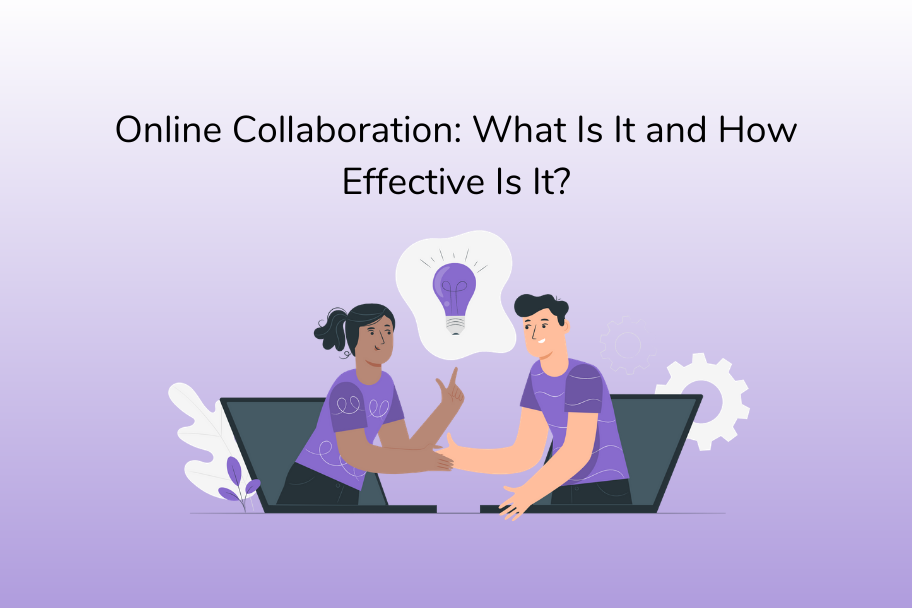Claromentis CEO Nigel Davies shares his take on what online collaboration means for the business world.
What is Online Collaboration and why is it important?
I would like to start by thinking about the meaning of the main concepts in this question. What do we mean by online collaboration? In the real business world what does “effective” mean?
“Collaboration” is accepted as working with others to do a task and to achieve shared goals. In my view this is wholly reasonable.
Many definitions of “online collaboration” are something like: “online digital collaboration enables a group of people to collaborate in real-time over the Internet”. For reasons that will become clear in the post – I don’t like the “real time” part of this and so simplify it to “online collaboration enables a group of people to collaborate over the Internet”
![[FREE GUIDE] HOW TO CREATE AN ONLINE COMPANY CULTURE](https://no-cache.hubspot.com/cta/default/5025095/404e6163-5acd-40fd-9d11-858bdb05ea69.png)
Since we can fairly well assume that most people get that online means the internet and that you need more than one person to collaborate we can basically say that these kinds of definitions are a waste of time – they are defining online collaboration as online collaboration.
And this is actually very interesting to me – it is implying that online collaboration is the same thing – but just an online version – whereas to me there are distinct differences.
“Effective” – should mean easy to adopt and use – and also to make a difference to collaboration in a very positive sense. By which I mean there is no point if something is really easy to use but doesn’t make a difference – similarly if the digital workplace provided for collaboration is so disconnected, unappealing and unintuitive that people move away and go back to the old ways clearly this was ineffective.
There are some strong differences between online and real-world collaboration
There are to me several aspects of collaboration that become quite different online, and they relate back to how we as human beings work together – and what emphasis we place on aspects of our interaction precisely because we are dealing with real people – as opposed to their online equivalents. I look forward to the views of others but to me there are some interesting implications:
Focus on a goal
In many collaboration efforts there is actually a less clear concept of a goal. This is not normally the case in real world collaboration – which starts from the formulation of a goal, moves to the allocation of resources that can be justified in terms of their costs against the value of the goal – and then to the selection of the ideal team.
By contrast in the online version the actual collaborative focus might actually be to simply discuss a concept – to explore it – and not actually to execute anything at all. The effort was not less successful – it just did not lead to something that needed execution.
The effort might evolve from a single post – at Claromentis we have discussed for many years the concept of “shout > collaborate > execute” and have used it to get from a post in our internal social media feeds, through to a collaboration space, and finally into a project management area to produce a more defined outcome.
I feel that in many cases the goal is the outcome of the online collaboration – and not the starting point. This partly stems I think from the fact that the initial contributions from people across the extended organisation are not expensive.
People consume and interact online at times that are convenient to them and on subjects that interest them. Initial ideas extend, morph and become new ones in a very different way from real world projects that require coordinated physical attendance and consequently an agreement to adopt a project role and free up sufficient time to be successful in that role.
Deadlines
Undoubtedly the concept of deadlines is strongly reinforced in physical meetings. Rational people will not be late for meetings as they know it inconveniences others and they would not wish to be on the receiving end of that kind of behaviour.
Everything has a sense of valuable time passing as we set and accomplish our tasks. Individuals might be allocated to project X just for this week before being scheduled to some other endeavour. Time therefore matters.
But in asynchronous online collaboration this sense of a coherent flow of time that is a limited resource and has real bearings on the project success are generally felt less strongly.
I recently found myself posting into a Claromentis social project room that was started over a year ago – and this had no implications for the value or relevance of my input. Interested people were still notified and could respond in exactly the same way as they would have done many months ago.

Fear of being wrong
There are many theories and best practices for dealing with different personality types that are trying to cooperate together in meetings and real world projects. We consider dominant people and how to ensure they do not drown out input from quieter team members. Certain personality types are hesitant to express views for fear of ridicule.
Many of these concerns are lacking in online collaboration tools – or at least expressed in more subtle ways. This allows us to benefit from a more even contribution according to each persons interest and skills – rather than biased by their personality type and confidence in physical meetings.
Questions and answers
Fruitful collaboration comes as much from asking questions as it does from answering them. While this is also important in real world collaboration we somehow expect that the big questions will already have been asked and that the credible answers – from identified experts – will have been used to set the goal and the budgets in terms of resource loading and timeframes.
There are many examples of simple questions producing revolutionary changes in our understanding – and these seem to be more facilitated online when people of very different skills and backgrounds can provide input so easily and on a very even footing with others.
![[FREE GUIDE] HOW TO CREATE AN ONLINE COMPANY CULTURE](https://no-cache.hubspot.com/cta/default/5025095/404e6163-5acd-40fd-9d11-858bdb05ea69.png)
The nature of the team
In the real world we would pay close attention to who we get in our team in terms of their skills in order to make sure we stand the best chance of meeting our goals. In a great and well planned team each team member might be expected to be devoted to the idea and committed to each other’s success – and in return they would look to have a well defined role and clear success criteria for their part of the team effort.
Conversely we may find that some team members were allocated to the project against their will or natural interest – simply because their manager or PM allocated them and they were available.
Online we are much more likely to formulate an idea and receive input from anyone who notices and has a view. This basically reflects the lack of barriers – the workforce can utilise the many skills of their employees regardless of where they or the data may reside.
Even the fundamental nature of the way we select a project team is so different – in the physical world we use our understanding of each others skills to build that dream team – online we may be incredibly surprised by the hidden expertise of individuals who may be hardly known to us – and we may find that what appeared to be a specific functional problem has already been solved in a completely different function.
Online people who collaborate together can be wholly unexpected, have perspectives that can fundamentally change the project – and can come and go with much more fluidity.

Leadership
Leadership – as opposed to chaotic activity – is a strong success factor in real world collaboration. We very much understand the concept and role of a team leader, and we might expect a team with no leader to falter. In the online world this can be less clear, for various reasons:
- The initial goal might not be so well defined
- The goal can change as fundamentally new and unexpected perspectives arrive
- No one need necessarily control schedules – for many online collaborative efforts people work on a time that suits them, without requiring resource scheduling
Of course online collaboration comes in very different types, scale and with very different timeframes and resources – some very small and ill defined, some tight and very well thought out and planned. But it does seem to me that more often than in real world equivalents the role of a clear and responsible leader is less relevant.
I also detect that sometimes the lack of a leader can allow online collaboration efforts to stop when this is exactly the best outcome. In the real world what turns out to have been an ill-conceived project might be carried on to conclusion precisely because the leader accepted the goal of delivering it and does not want to be seen to fail.
Expert knowledge
There are many studies of students learning online that show that the expert should hold back from intervening too early. That social learning can in fact replace expert knowledge. In real world collaboration, at meetings – we look to the expert and their scheduled availability means they will provide their answers and perspectives right from the first moment.
This can lead to the problem never changing its definition – to perhaps to rather fixed mindsets – since the expert(s) probably helped define the problem, and hence the goal – and will strongly influence the method used by the team to deliver it.
In more flexible online collaborative efforts the experts themselves might drift in and out of the space, and new experts with different views can easily bring very fresh and potentially ground breaking perspectives.
This social learning seems to me to be much more likely to occur in online collaborative efforts.
At the same time
I want to return to the definition of online collaboration – when I mentioned that I wanted to remove any reference to “real-time”, or “at the same time”.
To me one of the extremely helpful aspects of online collaboration is precisely the fact that it can be asynchronous. In my view too much emphasis is placed on actual online chat, video conferencing and web based screen shares.
Useful though these are – they are simply using the internet to try to replicate physical collaboration when people are not in the same location. Their synchronous nature requires precisely the resource scheduling and leadership that online collaboration often does not have and in my view should be freed from.
It is immensely liberating to commit to tools that do not require participants to act at the same time. We have all seen the way we can share information with our friends in Facebook and Twitter streams – we absolutely do not have to be online and available at the same moment.
Conversations and the exchange of ideas can be equally effective if they take place over extended periods. The fact that the conversation is there for others to see facilitates input from other people that is absolutely not planned and therefore both surprising and potentially high value.
Summary
To me online collaboration is not an exact equivalent of physical collaboration. At its most effective and surprising it should be asynchronous, more free flowing and less controlled. I therefore think care should be taken on selecting the kind of projects that should be wholly real world, online or hybrid.
In these days of valuable web based software tools we should not confuse the nature of the collaborative model with the tools used. Even the most extreme real world high pressure collaborations will use web based software tools – this does not mean they are fundamentally online collaboration efforts in any meaningful way.
Projects that are more about idea exchange and evolution suit the online collaborative model well – projects that have physical expression and real deadlines such as those in the construction sector – as an obvious example – should have a strong real world component and leadership – leveraging online digital landscapes for the rich and essential information management toolset that they bring rather than to fundamentally change the nature of the collaboration.
How effective online collaboration is will to some extent depend on the initial applicability of the project – as well as the digital landscape and company cultures that must underpin and facilitate these efforts.





